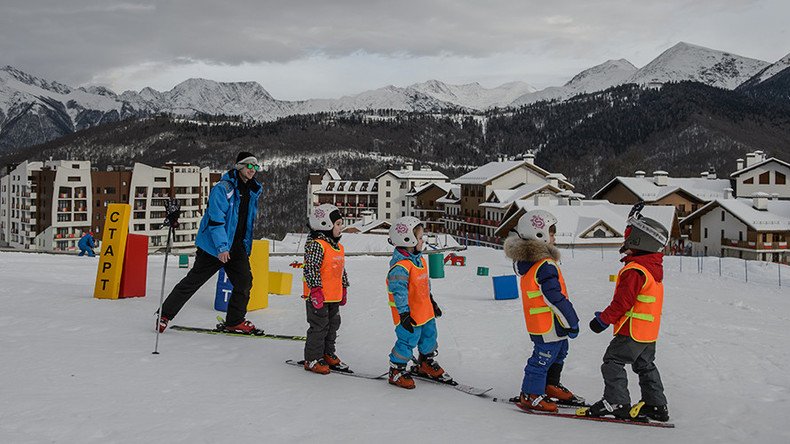Why do some journalists continue to write obvious lies about Sochi?

Plenty of Western media outlets work hard to cast Russia in a bad light. Some even make it a kind of existential bogeyman. Germany’s Bild or Britain’s Sun are good examples. However, the Daily Beast goes further. It specializes in it.
I’ve never met Anna Nemtsova. Also, I’ve no interest in smearing her. She could be the nicest person in the whole world for all I know. Thus, this post isn’t about Ms Nemtsova. It’s about how correspondents for Western institutions constantly misrepresent Russia. Often, the 2014 Winter Olympics being a case in point, it seems they compete to outdo each other for negativity.
Nemtsova has visited Sochi recently. Last weekend, she filed a piece on the closure of a gay bar there. During her sojourn, she took to Twitter to insist that there were “few tourists and lots of empty hotels” in the city. To ‘prove’ her point, Nemtsova provided pictures of an empty beach. That was an empty beach in January. The coldest month of the year. Of course, even famous European sunspots like the Algarve, the Amalfi Coast and Andalusia can hardly boast packed shores at the start of the year.
Putin's residence town on the Black Sea, Sochi grows too expensive for locals. Few tourists &lots of empty hotels. pic.twitter.com/rVNJzs3PZM
— Anna Nemtsova (@annanemtsova) January 22, 2016The tweet is dated January 22nd. Accuweather reports that the highest temperature in Sochi that day was a mere eight degrees Celsius. The evening low was three degrees. Now, you don't need to be wizard to guess that a beach resort - even a subtropical one - would not be jammed in January.
A question of cash?
As Nemtsova is doubtlessly aware, Sochi is a dual purpose resort. In winter, the seaside areas empty and the focus switches to the winter sports facilities in the nearby mountains. This is where the Olympic outdoor events were held. In summer, the situation is reversed. Beaches full, mountains empty. For obvious reasons.
Nemtsova insists that Sochi has grown too expensive. Disbelieving this, I asked Dmitry Bogdanov, a local legend of the tourism industry for the real story. Bogdanov, owner of “Healthy World,” replied: “Over the holidays (in Russia roughly first two weeks of January), everything was good. Better than last year for sure. The second half of January is quieter, as always. But that’s predictable.”
I followed up and asked Dmitry to place his assertion that things are “better” in numbers. He answered: "We had a travel sales growth of 25 percent in January 2016, compared to January 2015.”
Bogdanov’s figures make sense. After all, external travel options for Russians have markedly diminished, due to the economic crisis, so winter sports enthusiasts have to go somewhere. As Sochi is inside the ruble zone, it makes sense that many would visit it as an alternative to European destinations.
The real story
Not satisfied with that, Nemtsova further alleges that “in post-Olympic Sochi pensioners fish every day, to get some additional income; watching luxurious yachts (sic).” This really made me laugh.
In post-Olympic #Sochi pensioners fish every day, to get some additional income; watching luxurious yachts. pic.twitter.com/UyQi3k7WD2
— Anna Nemtsova (@annanemtsova) January 20, 2016You see, I know these guys. I know them because I run along there every morning when I'm in town. It’s the Morport. In fact, I have often stopped and talked to them. They are not fishing for extra cash. Rather they are hobbyists, doing it for fun. In fact, here’s an old picture taken at the exact same spot on a warmer day. You will note that many are very well-dressed.
Intrigued by the daily gathering, I once asked the group what the attraction was. They told me that it’s just a meeting point for men to get together and talk. A sort of community. As for the fish they catch, they insisted they normally give it to stray cats and dogs. Nevertheless, if it’s a particularly nice specimen, they might keep it for their own dinner. This kind of leisure fishing is popular all over Europe, even in wealthy Switzerland and Norway.
Unfortunately, despite pre-Olympics efforts to improve matters, Sochi still has a problem with loose hounds. This is mainly because many Russians refuse to sterilize their pets, despite repeated attempts to convince them of the merits. If you’d like to help, the people at the wonderful ‘Sochi Dogs,’ a non-profit charity, do their best to assist the poor animals. The link to their website is here.
Anna Nemtsova has a large audience at The Daily Beast. As it's predominantly American, I'd guess that about 99 percent of them have never been to Russia. As a result, they rely on her to be their ‘human camera’ in the country.
On Twitter, Nemtsova has chosen to deliberately misrepresent Sochi this week. She isn't the first journalist guilty of this, and she probably won't be the last. However, this is a particularly blatant example. It also begs the question, if major Western outlets can so freely lie about Sochi; can they be trusted on the really big Russia stories?
The statements, views and opinions expressed in this column are solely those of the author and do not necessarily represent those of RT.













